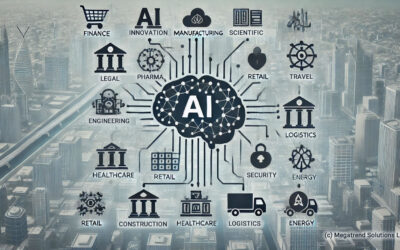Artificial Intelligence (AI) has become a cornerstone of modern business strategy, enabling companies to streamline operations, enhance customer experiences, and drive innovation. However, the adoption of AI should not be taken lightly. Implementing AI requires significant investment in time, resources, and expertise. Before diving into AI, it’s crucial to assess whether your company truly needs it and how it can add value to your operations. Here’s a comprehensive guide to help you evaluate the need for AI in your company.
1) Understand What AI Can Do
The first step in assessing the need for AI in your company is to understand what AI can actually do. AI is not a one-size-fits-all solution; it encompasses a broad range of technologies and applications, from machine learning and natural language processing to computer vision and robotic process automation. Each of these technologies can solve specific business challenges, but it’s essential to match the right AI application with the right business problem.
For instance, machine learning can be used to analyze large datasets and uncover patterns that humans might miss, making it ideal for tasks such as predictive analytics, customer segmentation, and fraud detection. Natural language processing can enable chatbots and virtual assistants to interact with customers in a human-like manner, enhancing customer service and support operations. Computer vision can automate quality control in manufacturing or provide advanced security solutions through facial recognition.
By understanding the capabilities and limitations of AI, you can begin to identify areas within your company where AI could potentially make a difference.
2) Identify Business Challenges and Opportunities
The next step is identifying the specific business challenges and opportunities that AI could address. This involves a thorough analysis of your current operations, processes, and market environment. Start by asking the following questions:
- What are the most time-consuming and repetitive tasks in your company?
- Are there areas where human error is a significant risk or where precision is critical?
- Do you have large datasets that are underutilized or could be better leveraged for decision-making?
- Are there customer service challenges that could be improved with automation?
- Could AI help you gain a competitive edge by offering personalized customer experiences or optimizing your supply chain?
By identifying these pain points and opportunities, you can determine where AI could deliver the most value. For example, if your customer service team is overwhelmed with inquiries, a chatbot powered by AI could handle routine questions, freeing up your human agents to focus on more complex issues. If your marketing team struggles to analyze customer data and predict trends, machine learning algorithms could help uncover insights and optimize your campaigns.
3) Evaluate Your Data Readiness
AI relies heavily on data. To effectively implement AI, your company must have access to high-quality, structured data that can be used to train AI models. Assessing your data readiness involves evaluating the availability, quality, and structure of your data.
- Data Availability: Do you have sufficient data to support the AI applications you’re considering? For instance, machine learning models require large datasets to learn and make accurate predictions. If your data is limited, you may need to invest in data collection efforts before implementing AI.
- Data Quality: Is your data clean, accurate, and up-to-date? Poor-quality data can lead to inaccurate AI predictions and insights. Ensuring data quality is a critical step before deploying AI.
- Data Structure: Is your data well-organized and easily accessible? Structured data, which is organized in databases or spreadsheets, is easier for AI algorithms to process. Unstructured data, such as text or images, may require additional preprocessing before it can be used effectively.
If your data readiness is lacking, it may be worth investing in data management solutions and processes before moving forward with AI.
4) Assess Your Company’s Technological Infrastructure
AI implementations often require advanced technological infrastructure, including powerful computing resources, cloud services, and integration capabilities. Assess whether your current IT infrastructure can support AI applications or if upgrades are needed.
- Computing Power: AI algorithms, especially those involved in deep learning, can be computationally intensive. Ensure your company has access to sufficient computing power, either on-premises or through cloud services.
- Cloud Infrastructure: Cloud platforms like AWS, Google Cloud, and Azure offer scalable computing resources and AI services that can accelerate your AI projects. Evaluate whether your company is ready to leverage these platforms.
- Integration: AI solutions need to integrate seamlessly with your existing systems, such as CRM, ERP, or marketing automation platforms. Assess whether your current systems can be easily integrated with AI technologies.
5) Consider the Cost-Benefit Analysis
Implementing AI involves a significant investment, not just in terms of technology but also in training, development, and ongoing maintenance. Conduct a cost-benefit analysis to determine whether the potential benefits of AI justify the costs.
- Costs: Consider the costs of AI software, hardware, cloud services, data storage, and talent acquisition or training. Also, account for the time and resources required to implement and maintain AI solutions.
- Benefits: Weigh these costs against the potential benefits, such as increased efficiency, cost savings, improved decision-making, and enhanced customer satisfaction. Quantify these benefits wherever possible to determine the return on investment (ROI). If the expected ROI is positive and aligns with your strategic goals, AI could be a valuable addition to your company.
6) Evaluate the Need for Expertise
AI projects require specialized skills and knowledge, including data science, machine learning, and software development. Assess whether your company has the internal expertise to manage AI projects or if you need to hire new talent or partner with external experts.
If you lack in-house expertise, consider partnering with AI consultants or firms like Megatrend Solutions, which can provide the necessary guidance and support to ensure a successful AI implementation.
Conclusion
Assessing the need for AI in your company is a critical first step in your AI journey. By understanding what AI can do, identifying business challenges, evaluating data and infrastructure readiness, conducting a cost-benefit analysis, and considering the need for expertise, you can make informed decisions about whether AI is the right fit for your company. If you determine that AI has the potential to add significant value, a well-planned, strategically aligned AI implementation can position your company for success in the digital age.
Our AI Readiness Assessment is designed to help your business evaluate its current status and identify the right steps to harness AI effectively and sustainably. Join us for a complimentary online discussion to explore your needs and goals (no commitment required) before deciding if our AI-Readiness Assessment is right for you.






